What You Need to Know
- Global Investment Performance Standards (GIPS) were created to establish a more uniform process for financial institutions to report returns.
- This can be a lengthy and costly process, but it’s worth the investment to show credibility.
- Advisors who are GIPS-compliant may have an easier time under the SEC's new Marketing Rule.
You can be savvy and sophisticated and still become the victim of a financial scam. After all, when Bernard Madoff’s 20-plus-year Ponzi scheme was finally exposed, his long list of victims included billionaire business owners, entertainment moguls and highly esteemed charities, as well as banks, hedge funds and feeder funds. The FBI estimates that every year, Americans lose $40 billion to investment fraud.
Short of operating a billion-dollar fraud operation, some advisors could mislead their clients in much smaller ways, by cherry-picking returns or by failing to be transparent about fees and expenses and how they affect returns. But investment professionals have an opportunity not only to comply with regulations, but to go above and beyond to help inspire investor confidence.
On the most basic level, investors can start to protect themselves by doing financial due diligence — verifying third-party statements from an independent custodian, reviewing audited financials and requesting independently verified returns. Educating clients in these areas can provide advisors with a unique opportunity to build trust with them.
In addition to living by the fiduciary standard, becoming compliant with Global Investment Performance Standards (GIPS) can help create confidence and transparency in your relationships with your clients.
These standards were created by the Chartered Financial Analyst (CFA) Institute to establish a more uniform process for financial institutions to report financial returns. Today, becoming GIPS-compliant is considered the gold standard in the industry, allowing investors to compare one firm’s performance against another in the United States and across international borders.
For advisors, becoming GIPS-compliant should be standard practice, no different from a physician who is board-certified or an attorney who is licensed to practice law within their state. Though there are 14,806 SEC-registered advisors, only 1,714 financial firms — or 8.13% — claim compliance with GIPS. Becoming GIPS-compliant can be a lengthy and costly process, but it’s worth the investment to show credibility to potential investors.









 February 03, 2023 at 05:22 PM
February 03, 2023 at 05:22 PM











